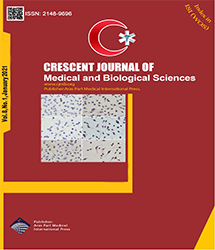
| Original Article | |
| The Efficacy of Magnesium Supplementation in Children With Attention Deficit Hyperactivity Disorder under Treatment With Methylphenidate: A Randomized Controlled Trial | |
| Seyed Gholamreza Noorazar1, Parinaz Kalejahi2, Sepideh Setayesh1, Shahrokh Amiri1, Neda Yasamineh3 | |
| 1Research Center of Psychiatry and Behavioral Sciences, Tabriz University of Medical Sciences, Tabriz, Iran 2Nutrition Research Center, Tabriz University of Medical Sciences, Tabriz, Iran 3Dental and Periodontal Research Center, Faculty of Dentistry, Tabriz University of Medical Sciences, Tabriz, Iran |
|
|
CJMB 2021; 8: 073-076 Viewed : 4377 times Downloaded : 3534 times. Keywords : Attention deficit hyperactivity disorder, Magnesium, Methylphenidate |
|
| Full Text(PDF) | Related Articles | |
| Abstract | |
Objectives: The prevalence of attention deficit hyperactivity disorder (ADHD) in children has been rising more rapidly in recent years. Studies have shown that attention to the nutritional deficiencies in these children can be effective in controlling symptoms. Therefore, we decided to examine the magnesium supplementation in children with ADHD under treatment with methylphenidate. Materials and Methods: The study was conducted on 40 children with ADHD. The children were randomly assigned to 2 groups. The intervention group (n = 20) received magnesium tablets (10 mg/d) with methylphenidate (0.5 to 1 mg/kg/d) for eight weeks and the control group (n = 20) received placebo with methylphenidate (0.5 to 1 mg/d). Both groups were assessed before and after the intervention using the Conner"s parent rating scale. Results: At baseline, the mean total score was 74.4 ± 10.4 in the intervention group and 76.8 ± 6.6 in the control group (P = 0.79). At the end of the study, the total score of Conner"s Parent Rating Scale was 61.9 ± 11.1 in the intervention group and 68.8 ± 7.3 in the control group (P = 0.02). There was also a significant difference between the groups in the scores of the inattention subscale at the end of the study (P = 0.001). Conclusions: The findings of the present study suggest that magnesium supplementation with methylphenidate can be effective in reducing ADHD symptoms. |
Cite By, Google Scholar
Google Scholar
PubMed
Online Submission System
 CJMB ENDNOTE ® Style
CJMB ENDNOTE ® Style
 Tutorials
Tutorials
 Publication Charge
Medical and Biological Research Center
About Journal
Publication Charge
Medical and Biological Research Center
About Journal
Aras Part Medical International Press Editor-in-Chief
Arash Khaki
Deputy Editor
Zafer Akan


















